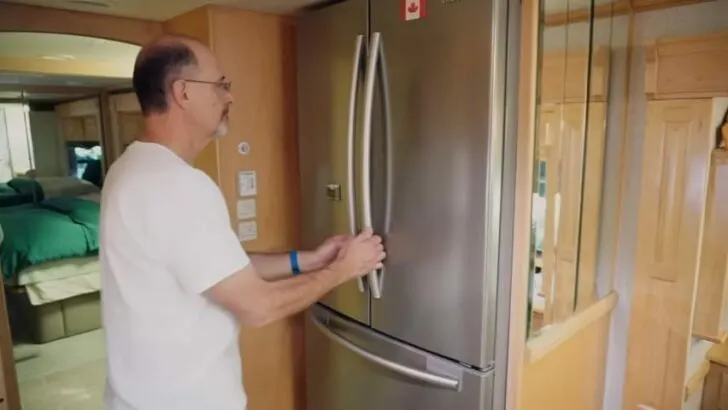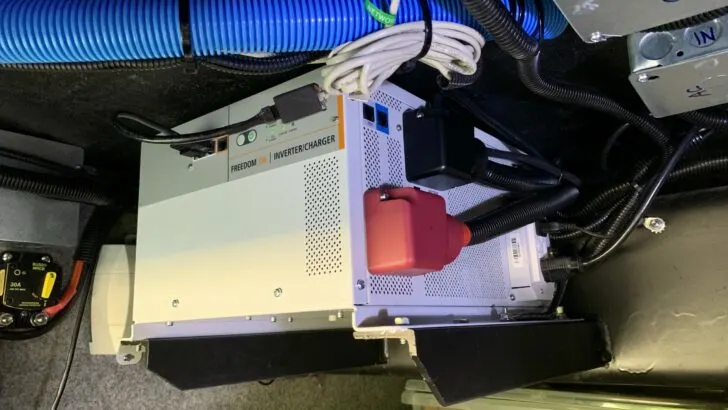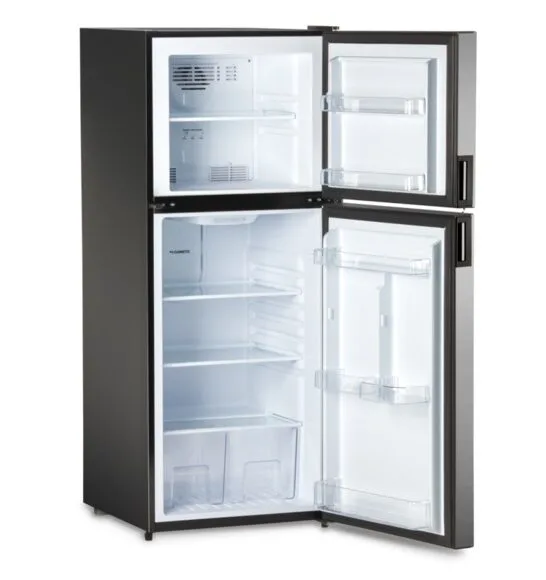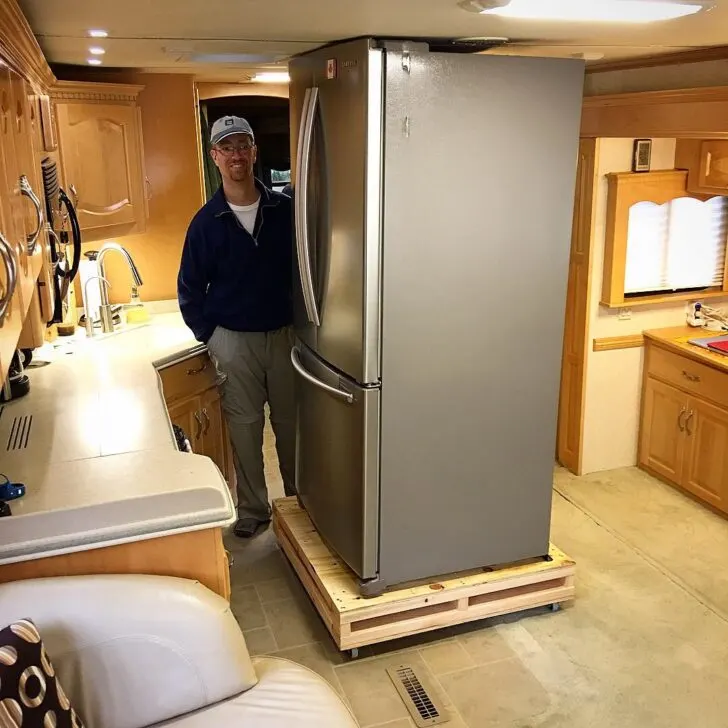We recently published a post on RV refrigerators covering the absorption-style refrigerators (2-way and 3-way) that are traditionally found in an RV. We covered how they work, some pros and cons, and a few tips for keeping things cold. And, before that, we had a post about the benefits of residential refrigerators in RVs. But in addition to these two options, there’s another type of refrigerator on the market that may serve some RVers better than the existing options. Today’s post looks at all of the currently available refrigerators for RV use, with an eye toward helping you to decide what’s the best RV refrigerator for you and your family.
What Kind of Refrigerators Work in an RV?
Actually, most types of refrigerators will work in an RV given the required power. In fact, we have an all-electric residential refrigerator in our RV, no different from the sort of double-door refrigerator with a large freezer that you’d find in a sticks-and-bricks house.

All-electric residential refrigerators are one option for full-timers like us or for folks traveling with larger families. The space is fantastic as is the cooling ability, but the power draw means you’ll have to make some adjustments if you’re boondockers like we are.
But the amount of power required to run a residential fridge is considerable, and we’ve gone to some length to be able to power ours when we’re off the grid for weeks at a time (which is frequently), without having to run our generator.
So what are the choices for refrigerators in RVs? Basically, there are two main classes of refrigerators available, separated by the process used to cool:
- Absorption Refrigerators
- Compressor Refrigerators
Within each of those classes, there are two choices. For gas absorption refrigerators, you have your choice of a 2-way model (which runs off of propane or 120V AC electric) or a 3-way unit (which also runs off propane/12oV AC, but adds in the option of 12V DC).
Compressor refrigerators have, traditionally, been powered by 120V AC power and are what we all know as household, residential-style refrigerators. In recent years, they’ve been a popular option in RVs, but they have the drawback of requiring 120V AC power in order to run. This means you either need to be plugged into shore power, run your generator, or have sufficient battery power to run the fridge using your inverter. And when off the grid, that means having to have your inverter powered on all the time in order to keep your fridge cooling. From our experience with our 120V AC refrigerator, that requires a LOT of power (ours consumes about 130-150 amp-hours of power from our battery bank in a 24 hour period).
And that’s where the latest addition to RV refrigerator options comes in: the 12V DC powered compressor refrigerator. It has many of the same benefits as a 120V AC refrigerator, without the need for 120V AC power. That eliminates an inefficiency in power conversion. There’s now no need to take 12V DC power from your battery bank and convert it to 120V AC power just to run your fridge. A 12V DC compressor refrigerator just runs directly off your battery power.
So, with these four choices in mind, let’s take a look at the pros and cons of each type to help you to determine what’s the best RV refrigerator for you.
What’s the Best Refrigerator for an RV?
The best RV refrigerator is the fridge that works best for your family’s RVing lifestyle. RVers who always camp at RV parks and campgrounds will have needs that differ significantly from those who boondock nearly exclusively, as we do.
In addition to the type of power RV fridges use, choices vary based on size and other considerations. Let’s take a look at the pros and cons of absorption (two-way and three-way), 120V AC residential-style refrigerators, and the newest 12V DC compressor refrigerators.
Absorption RV Refrigerators
This is the best-known type of RV fridge, and what people are generally referring to when they use the term “RV fridge.” It’s also known as an “absorption fridge” because of the chemical process it uses to create the cold to keep your food fresh. It uses heat to trigger an ammonia-based refrigerant to change phases from liquid to vapor and then back again, and it is that cycle that creates the cold. The heat needed can be provided by using either propane or electricity (120V AC or 12V DC).
Either way, the circuitry that controls the “brains” of an RV fridge always uses 12V DC. But that power requirement is minimal, making the “propane” mode highly desirable for off-grid use.
If it seems counterintuitive to imagine the burning of anything creating a cool environment, read our thorough review of how the absorption process works by visiting our recent post introducing RV fridges.
Bearing in mind that absorption refrigerators use liquid propane gas as one means of cooling, and also offer either 12oV AC (two-way) or both 12V DC and 120V AC (three-way), there is a unique advantage to absorption refrigerators.
Pros of Absorption RV Refrigerators
Absorption fridges can run on liquid propane gas which is a great advantage when you don’t have access to power. This makes camping off-grid simple and relatively carefree.

We no longer use propane for our RV refrigerator, but we do have other uses for propane.
With a two-way RV refrigerator, you’ll also have the ability to use 120V AC power (from shore power, your generator, or an onboard inverter) to keep your food cool. And with a three-way fridge, you’ll have the additional option of running the cooling cycle off of 12V DC power (typically only while the engine is running so the alternator can keep your RV’s house battery from being depleted… quickly!).
Another advantage of absorption refrigerators is that they tend to be well insulated. Because the time needed for the cooling cycle to run is somewhat long, they need that insulation to ensure the contents of the fridge don’t see temperature fluctuations that are too great. That means you can turn an absorption fridge off completely and, as long as you don’t open the doors (much or at all), it will keep your food plenty cold for hours.
Finally, the absorption refrigerators used in RVs are designed from the ground up for that purpose. As a result, they have doors the lock closed, which ensures that the contents of your fridge STAY in the fridge, even when underway.
Cons of Absorption RV Refrigerators
There are a few disadvantages to absorption fridges. One is size. Two-way and three-way RV refrigerators tend to be somewhat small. For many travelers, this isn’t an issue, but for full-timers like us, it’s far from ideal.
More importantly, however, absorption refrigerators often don’t cool as well, or as consistently, as compressor-based fridges. A rule of thumb is to expect an absorption fridge to cool to about 40 degrees below ambient temperature. That’s great until you’re camping in the 90-degree summer heat, or until you find yourself parked in the sun and your RV’s internal temperature rises substantially.
There are ways to mitigate this problem somewhat, such as parking in the shade or installing fans into the back of the absorption fridge to help improve the efficiency of the gas absorption cooling cycle. But, in general, absorption fridges may not provide adequate cooling for every RVer. (And it’s tough to keep ice cream frozen which in John-speak is a mortal sin.)
If you have a three-way fridge and you tend to going from campground to campground with full hookups and plugging your fridge into shore power while you’re camping, you may find an absorption fridge to be perfectly adequate.
Some might consider the need for propane as a downside of absorption fridges. While absorption style cooling is – well – cool, where there’s propane there’s always a risk of fire.
Finally, one minor inconvenience of RV absorption refrigerators is the need for the RV to be level during operation. But generally speaking, if you’re comfortable inside the RV, then the RV should be sufficiently level to run on propane.

RV absorption refrigerators that use propane must be fairly level in order to work properly.
120V AC Residential-Style Refrigerator
Residential refrigerators operate on 120V AC electricity, so when you’re RVing with a residential fridge, you’ll be using 12V DC power from your RV’s house battery bank converted to 120V AC power by an inverter. Let’s have a look at the pros and cons of this arrangement.
Pros of 120V Residential Refrigerators in RVs
The greatest advantages of a residential RV refrigerator are size and the ability to keep the contents of the fridge and freezer consistently very cold. (That’s “Yay! Ice cream!” in John-speak.)
RV residential refrigerators are great for larger families and full-timers and are especially good for long-term boondockers like us (as long as you have the power to run it… more on that in a minute). The ability to stock the fridge and freezer with plenty of good food, and to be able to rely on consistently safe cooling while we’re away from grocery stores for an extended period is what works best for our lifestyle. The ability to keep ice cream frozen solid is a bonus.
Residential-style refrigerators also have the benefit of being frost-free. So no matter what the humidity level is where you’re camping, or how many times you open the fridge/freezer door(s) to see what there is to eat, they’ll regularly run through a defrost cycle to keep things operating efficiently.
All of these conveniences are worth the trade-offs for us. What are those? Let’s take a look.
Cons of 120V Residential Refrigerators in RVs
There are some disadvantages to having a residential RV refrigerator. These are a deal-breaker for many, and understandably so, but this is why we say that the best RV refrigerator is a fridge that works best for your lifestyle. The decision must factor in the unique needs of the RVer making the choice.
Residential refrigerators weren’t designed for use in a moving vehicle and, as such, don’t include the same door-locking mechanisms that an RV absorption refrigerator has. In order to be used in an RV, residential refrigerators have to have some modification done in order to keep their doors closed while the RV is in motion. In many cases, that’s an aftermarket locking device that you have to remember to lock before leaving camp… which means it can be forgotten.
Another disadvantage of a residential refrigerator is the fact that although some RV manufacturers are now shipping larger RVs with residential fridges, this is certainly not the norm. This means that many RVs, especially older ones, would need to be retrofitted with a residential fridge, and that’s not always an easy process.
See our post bemoaning sharing our experience of getting our residential fridge into our 43-foot diesel pusher. We’ve got a very large motorhome, but most RVs are built AROUND large items like fridges, and retrofitting a large appliance is not a simple task.

Retrofitting an RV with a new large refrigerator can be a real chore because RVs are usually built AROUND large appliances.
One significant disadvantage to a residential refrigerator is the power draw. There’s no getting around this one. Residential refrigerators require substantial power (of the 120V AC variety) to run. And of course, refrigerators need to be powered constantly. This brings us back to the question of how one provides sufficient AC power to run a large residential fridge when camping off the grid.
As noted earlier in this post, we opted to install a very substantial solar array and a Xantrex e-GEN lithium-ion battery (save 5% with Discount Code RVGEEKS), as well as an equally substantial Xantrex Freedom SW 3012 inverter/charger (to change the 12V DC power from our battery bank to 120V AC power) so that we could opt for power-hungry appliances like a residential fridge, an array of always-on internet connectivity and related tech gear, and dueling computers… even though we regularly boondock far away from shore power sources for extended periods of time.

Our Xantrex inverter/charger is one part of the system that allows us to run our residential fridge and everything in our technology cabinet when we’re off the grid.
But what we do to be able to boondock in remote areas while still being able to run a residential fridge and all of our power-hungry tech gear wouldn’t be what’s best for every RVer. Not by a long shot.
Our lifestyle calls for all of this to keep us in our day-to-day comfort zone as we travel, live, and work full-time in our motorhome.
For someone who travels part-time and/or who usually connects to shore power at campgrounds and RV parks, the type of setup we have would not be necessary. However, a residential refrigerator would require adequate power to run while you’re traveling to and from the campgrounds and parks with shore power.
12V Compressor Refrigerator
A 12V compressor RV refrigerator runs on the 12V DC power provided by your RV’s house battery bank. This is a great concept, as it eliminates the need for both LP (liquid propane) gas and 110V AC.
Many van and car campers use small and/or portable 12V compressor fridges, but in this case, we’re referring to the larger version such as this 10 cu ft residential style Dometic fridge.

The Dometic DMC4101 12V DC compressor refrigerator is a residential-style unit with digital controls and 10 cu ft of space. (Photo courtesy of Dometic)
This RV refrigerator runs on 12V DC all the time and is another option for travelers who prefer an all-electric fridge. Our friends Tom & Cait Morton have this exact fridge and love it.
However, this fridge isn’t for us because it’s limited to 10 cubic feet of space, and we prefer a larger fridge (our current fridge is 18 cubic feet which suits our lifestyle well). When we arrive in an extremely remote location, it’s not uncommon for us to stay put for 2 weeks or more at a time. Since we eat as much fresh food as we can, and don’t want to be forced to run out to a distant grocery store during our stay, a larger fridge works better for us.
One would think that the strictly 12V fridge might use significantly less power than our 120V all-electric fridge, and while it does use less power, it’s not as large a difference as we might have thought. This means that this fridge would also require a fairly beefy battery bank to power it for very long… and a similarly large solar setup to replenish that power.
However, the difference is that with a 12V fridge you wouldn’t necessarily need a large inverter like ours, or an inverter at all, for that matter. An inverter is needed to convert 12V DC power into 120V AC power for use by a residential fridge and other household appliances. With a 12V fridge, that conversion isn’t necessary, so an inverter isn’t needed to run it. Considering the fact that an always-on inverter is another constant power draw, this is a benefit of the all-electric 12V fridge over the all-electric 120V residential refrigerator.
Pros of 12V Compressor RV Refrigerators
There are many advantages to a 12V compressor fridge. Among the greatest of these advantages is that a 12V fridge eliminates the need for propane (unless you require it for your stove, oven and/or heater), while also eliminating the need for a large inverter to convert electricity from 12V DC to 120V AC. This is a somewhat inefficient use of power, an admission we make while also acknowledging that this is what we do for the luxury of having a large residential refrigerator.
12V compressor refrigerators are also more efficient than a gas absorption refrigerator (when running on 120V AC or 12V DC power), which means they can run for longer off of the same power.
Because the compressor-based cooling unit is smaller than an absorption style system, 12V compressor refrigerators offer more interior space in the same footprint. That means if you were to convert your RV refrigerator, you could gain some interior storage space without having to perform a major retrofit.
- Item Package Quantity - 1
- Product Type - REFRIGERATOR
The 12V compressor fridge is strictly electric, doesn’t require ventilation, and doesn’t have the same potential for a fire hazard that an absorption refrigerator does. And because these are custom-engineered units designed for use in an RV, they typically have the same door-locking mechanisms that absorption refrigerators have, ensuring that your food stays INSIDE the fridge while you’re traveling!
Another advantage to the 12V all-electric RV refrigerators is that they cool very well & consistently (like their 120V residential counterparts) and live up to John’s ice cream standards which are admittedly ridiculous quite high.

There’s a pint of Ben & Jerry’s hidden under there, and it’s part of the reason we so enjoy our residential refrigerator/freezer.
Cons of 12V Compressor RV Refrigerators
The disadvantages of a 12V all-electric compressor fridge include the fact that they’re expensive, though (honestly) ALL RV refrigerators are expensive.
We should repeat for the sake of clarity here that a 12V RV refrigerator doesn’t require as much power as a residential refrigerator thanks to the elimination of the need for an inverter and the greater efficiency of the strictly 12V fridge, but you’ll still need an ample battery/solar setup if you plan to be off-grid for long periods.
One additional note we’ll leave in the “con” section would not apply to all RVers certainly, but we see it as a disadvantage, and that is the size limitation. For many RVing families, and for us as full-timers who regularly boondock in distant locales, 10 cubic feet is simply not enough space (as other manufacturers get into the 12V compressor RV fridge space, this will likely change).
But again – our friends Tom and Cait love their 12V all-electric compressor fridge, having used it for quite some time now. So, this again is a matter of the personal preference of the RVer.
What Kind of RV Refrigerator Should You Choose?
As is likely clear by now, the best RV refrigerator is the one that works for you and your family and the RV lifestyle you lead. If you tend to be hooked up to shore power all the time, a 120V AC compressor refrigerator will likely be your best bet. But if you prefer being off the grid, absorption style refrigerators bring a lot of benefits to keep you from having to worry about power, while 12V DC compressor refrigerators offer a little bit of the benefits of both.
As is always the case, there are pros and cons to everything, but it’s the balance in accordance with your needs and desires that matters. Given all of the information above, we’re confident that you know what’s best for you!
So, the best RV refrigerator is the one you choose after careful consideration of what’s required to run each type of fridge along with how you intend to travel and camp.
The great thing is that the availability of lots of great technology makes it possible for us to keep food and beverages cold on the road without the use of ice. Additionally, we have several choices as to how we want to accomplish this, and yes – John doesn’t have to give up hoarding having plenty of good ice cream on hand.

This guy will go to great lengths to preserve his right to have ice cream. (The other guy’s not complaining either.)
Geek Out with Us Every Week
Join our newsletter to learn about all things RV-related. Every week we offer free tips, tricks, product reviews, and more to our online community of RVers. So, whether this is your first time on the road or you’re a seasoned expert, we’d love for you to geek out with us!



John
Friday 30th of June 2023
Another disadvantage of the Absorption fridge is that they don't work on Propane above 10,000 feet altitude. When the air is thin, the gas burner won't stay lit. The igniter goes "click click..." continuously, because it can't properly detect the presence of a flame. Sometimes it stays lit, but eventually, the dreaded "check" light comes on.
This is the MAIN reason why I want to get rid of the absorption fridge, and get a DC compressor fridge. Since I have solar and 240Ah of lithium batteries, i can easily run a DC fridge throughout the season.
Anthony
Sunday 5th of February 2023
I am looking for a comparison of different models of 12v compressor refrigerators. Like Dometic, Norcold, Rec pro, Conserv and GE. The specs's, efficiency, Warranty ect. Have you done that or will in the future. I know many RVers that are tired of there absorption type refers and want something better.
TheRVgeeks
Sunday 5th of February 2023
Hi Anthony... that's a good question. No... we haven't done a comparison of the different models and a quick Google search didn't find much, either. No promises, but we'll put it in our queue for topics to write about and see if we can get it out sometime soon.
Robin
Monday 5th of September 2022
I got here in the strangest way. My husband is an appliance repair technician and was telling me that he sees a lot of compressor issues in these residential refrigerators that are in rvs. Why? Because the body of the compressor pump is suspended inside the case and bounces around when riding in the vehicle. The suspension springs in the compressor case are not made for that kind of movement. I found this article while searching Google to see if there are different compressors made or available. I haven't found that out yet, but thought I'd comment.
TheRVgeeks
Monday 5th of September 2022
Thanks so much for the info, Robin! Glad you found us.????
RichP
Monday 7th of March 2022
You mentioned your residential fridge uses up to 130-150ah per day. That averages out to about 6amps per hour. This is about what our Notcold 2118 uses when on propane/12v. The Norcold uses close to 50amps DC when set to AC mode!
Lee Stauffer
Sunday 24th of October 2021
Having upfitted and built several RVs, I have had the choice to try many different fridges. Several of the lower cost residential fridges that we tried did not hold up to the rigors of RV travel. The best residential fridges are energy star rated, and draw less than 1000W per day, less than the 1500-1600W your fridge uses. We have sometimes replaced the 8cf gas fridge with a 10-11cf 12V or 120V fridge, in the same space. We then supplement it with a 51qt 12V compressor cooler.
The new inverter fridges are also more efficient.
TheRVgeeks
Monday 25th of October 2021
Hi Lee. There are, indeed, better and better options available these days. Our Samsung residential fridge IS quite a power hog... but the ice cream stays hard, LOL! ???? When this one dies, we'd likely replace it with one of the 12V compressor fridges on the market now (or in the future). Like the Dometic 12V (though a bit small for our liking at only 10 cu ft) or Norcold 12V (closer to what we're used to at 15 cu. ft... and with dual compressors for better energy savings and temp control).